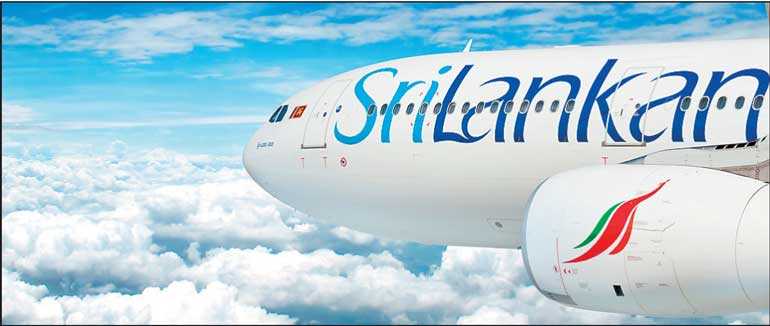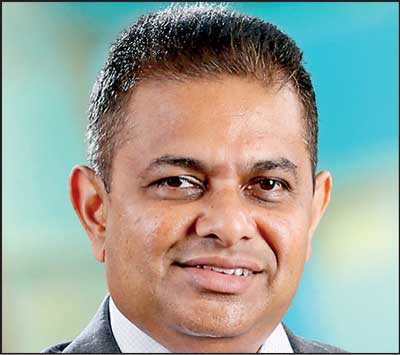Thursday Feb 19, 2026
Thursday Feb 19, 2026
Friday, 5 April 2019 00:20 - - {{hitsCtrl.values.hits}}

SriLankan Airlines said yesterday it has formulated a new five-year Strategic Business Plan for the period 2019-24 with the objective of transforming itself into a financially viable organisation airline group with high brand visibility and a global reputation for excellence, while turning Sri Lanka into a strategic hub for air travel and air cargo in the Asia-Africa-Middle East region.
 |
CEO Vipula Gunatilleka |
The Strategic Business Plan, which was crafted entirely by the management of the airline under the guidance of the Chief Executive Officer of the National Carrier and the Board recognises the enormous contribution of the National Carrier to the GDP of Sri Lanka in many different areas, including all export, import and leisure and envisages a corresponding increased contribution to the nation’s economy as the airline grows.
SriLankan Airlines CEO Vipula Gunatilleka said that having a sound strategy plan was important to any business and a business without a strategic plan was like a ship without a radar. Irrespective of the challenges the National Carrier encounters, the business must go on and hence it is important to have a clear vision and clear strategies if the airline is to become a financially viable entity. The Strategic Business Plan is to be presented for approval to the company’s shareholder, the Government of Sri Lanka.
A key aspect of the Strategic Business Plan includes developing a route network to match customer demand and market opportunities, including new destinations in Europe, Africa, the Middle East, South Asia, the Far East and Australia, as opposed to the current limited point-to-point strategy.
It also focuses on selecting a fleet that is cost effective and best matches the requirements of the route network; enhancing the customer experience by improving customer-centricity throughout the airline; adopting best practices to improve productivity; growing online sales to reach a wider market in a more cost effective manner; greater employee engagement; and implementing a competitive cost structure through a greater cost consciousness throughout the company.
SriLankan has already won several global accolades already this year including two ‘First Stars’ and a ‘Third Star’ at the Golden City Gate Awards at ITB Berlin 2019, the world’s largest travel trade event. In 2018, SriLankan 2018 bagged the accolades of ‘World’s Leading Airline to the Indian Ocean,’ ‘Asia’s Leading Marketing Campaign’ and ‘Asia’s Leading Airline to the Indian Ocean’ at the World Travel Awards 2018; and a ‘First Star Campaign’ and two ‘Second Star Campaign’ awards at the Golden City Gate Awards at ITB Berlin 2018.
The Strategic Business Plan has taken into consideration the varied impact of a wide range of market forces that affect the global air transport industry and in particular the region’s industry, including competitors, customers, suppliers and major costs such as fuel and currency fluctuation.
The Strategic Business Plan also calls for the strengthening of the route network through codeshare partnerships and alliances, especially by optimizing opportunities with oneworld member airlines. The Airline would continue to be a catalyst for the development of Sri Lanka’s tourism industry by aligning its network with the country’s tourism strategy and carrying out joint marketing efforts with Sri Lanka Tourism.
The Strategic Business Plan also includes a new Vision, Mission and Company Values for the National Carrier; and places a suitably heavy emphasis on it becoming an airline of the digital age with the use of the most modern technology, including fast travel technology, CRM based service delivery, data security and system availability, and the automation of manual processes. A key area of focus would be staff productivity and motivation, including learning and development, harnessing talent, and employee engagement.
The airline would also expand its use of standard operating procedures, global best practices, and re-engineering of processes. The airline’s core products would be enhanced through schedule optimisation, on time performance; enhancements to the inflight entertainment and cuisine; employee skill development and enhanced service culture; an enhanced Business Class product and cabin reconfiguration.
Service Standards are to be enhanced through a comprehensive Customer Relationship Management process that will include enhanced service levels at all customer touch point; system driven engagement; revamping of the FlySmiLes loyalty program; and social media interaction.
Digital transformation and technology adoption to transform processes across the Airline have been identified as top priorities , including expansion of direct online sales and generation of revenue from new digital businesses; and introduction of more digital payment options to reach new passenger segments by implementing e-wallets, online-mobile commerce and community based selling to create a digital market place.
Increasing the ancillary revenue from the Group’s sub business units and subsidiary; including SriLankan Cargo introducing innovative cargo products to boost yield, and the use of freighter operations to support cargo carriage on the SriLankan fleet; development of SriLankan Engineering as a maintenance-repair-overhaul (MRO) organisation of choice; exploring the opportunities to expand SriLankan Ground Handling to serve regional airports; and upgrading the SriLankan Aviation College to university status together with the addition of several more international affiliations.